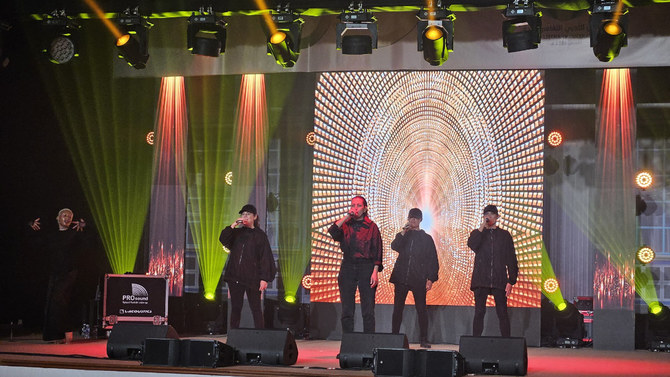JEDDAH: A World Music Day event organized by the French Consulate in Jeddah and the French Embassy in Riyadh featured local and French artists across a variety of genres.
The musical evening at the Jeddah Cultural Club included electronic, soul, deep house, pop and more on the theme of “Franco-Saudi Friendship.”
First established in France in 1982 under the patronage of then-Minister of Culture Jack Lang, who now serves as president of the Arab World Institute in Paris, the Fete de la Musique is celebrated in over 100 countries. Musicians at every level are invited to perform everywhere, from concert halls to the streets.
In Jeddah, two female voices were honored — Nadeen Linjawi, otherwise known as Fulana, and Canine, the brainchild of French composer and singer Magali Cotta.

Rising Saudi singer Nadeen Linjawi, known as Fulana, representing the emerging Saudi Arabian voice during the World Music Day in Jeddah. (Photo supplied)
Fulana, a rising Saudi singer, gave the opening performance and expressed her gratitude at being invited to represent the sound of young Saudis.
“Music has been my entire life; I don’t remember a time where I have ever been my most authentic self except here (on stage). This is the truest me,” she said.
“It seems that even when we are extremely happy to celebrate something luxurious or artistic like music, it is important to remember that when we say international, it often still applies only to those who don’t have to worry about basic human needs. What’s more important is to remember how lucky we are, be grateful for what we have, and send prayers for those who cannot celebrate International Music Day.”
Linjawi chose the name “Fulana”, which means “anybody,” because for her, the story she tells through her music could be anyone’s story. Her songs revolve around loss of identity, confusion, and loneliness.
In 2023, she produced seven songs and performed in Jeddah (Balad Beast) and Riyadh (Middle Beast), as well as Cairo, Amman, and New York during her “Notes on Swimming” tour. Her album “Banatafkar” was produced with Wall of Sound.
In the second part of the event, Canine took to the stage leading a group that captivated the audience with a blend of electro-pop, soul and hip-hop, woven through with surreal arrangements and deeply intimate lyrics.

Magali Cotta’s approach to music combines acoustic and electronic instruments. (Photo supplied)
The performance also featured excerpts from influential French personalities such as philosopher Gilles Deleuze, lawyer Gisele Halimi, and poet Charles Baudelaire.
In an exclusive interview with Arab News, Cotta shared insights into her creative process, inspiration, and the evolution of her unique sound.
She said the Jeddah event was “a journey exploring the core themes of hope, feminine strength, nature, and the night, transcending the traditional concert format to become an immersive experience.”
She added: “I enjoy collaborating with other artists. My most beautiful collaborations are with the musicians who accompany me on stage. Whether they are instrumentalists or singers, they are wonderful performers and add their sensitivity to the music I have written. Similarly, I consider the sound engineers who mix my music to be creators in their own right.
“Unfortunately we did not have time to collaborate with Fulana for this live performance, but I hope it will happen soon! I was very surprised to find a Saudi female artist in electronic music. I didn’t expect it, and it was a very pleasant surprise.”
Cotta’s approach to music combines acoustic and electronic instruments. She explained how she favors analog synthesizers for their organic warmth, while also incorporating acoustic instruments like brass and strings for a more delicate touch. This blend defies conventional boundaries, prioritizing emotional resonance.
“I use analog synthesizers rather than digital ones. Their sound is warmer and more organic. Sometimes, I need even more warmth and fragility, which leads me towards acoustic sounds. For me, there are no boundaries between acoustic and electronic sounds. They just need to be as moving as possible at any given point in the piece,” she said.

Cotta’s performance not only highlighted the Saudi Arabia’s growing electro-pop scene, but also underscored the universal language of music. (Photo supplied)
Cotta’s message resonated with the Saudi audience. She expressed a desire to move them, emphasizing the power of femininity and the group’s representation of musical roles that are traditionally dominated by males.
“We want to present a different image of what is expected of ‘femininity.’ For us, femininity is connected to nature; it can be fragile, but it also possesses immense strength,” she said.
Cotta’s performance not only highlighted the Kingdom’s growing electro-pop scene, but also underscored the universal language of music.
As for the future, Cotta is currently working on her third album and preparing new performances for the year ahead. She hopes to return to Saudi Arabia with a new show.
On June 27, the French Embassy in Riyadh in partnership with Alliance Française, Beast House and MDL Beast hosted a day-long event dedicated to promoting music culture.
Beast House came alive with rhythm, with the line-up including a special performance by Canine as well as DJ sets by JOJ, Vinyl Mode, and D’JULZ.





























